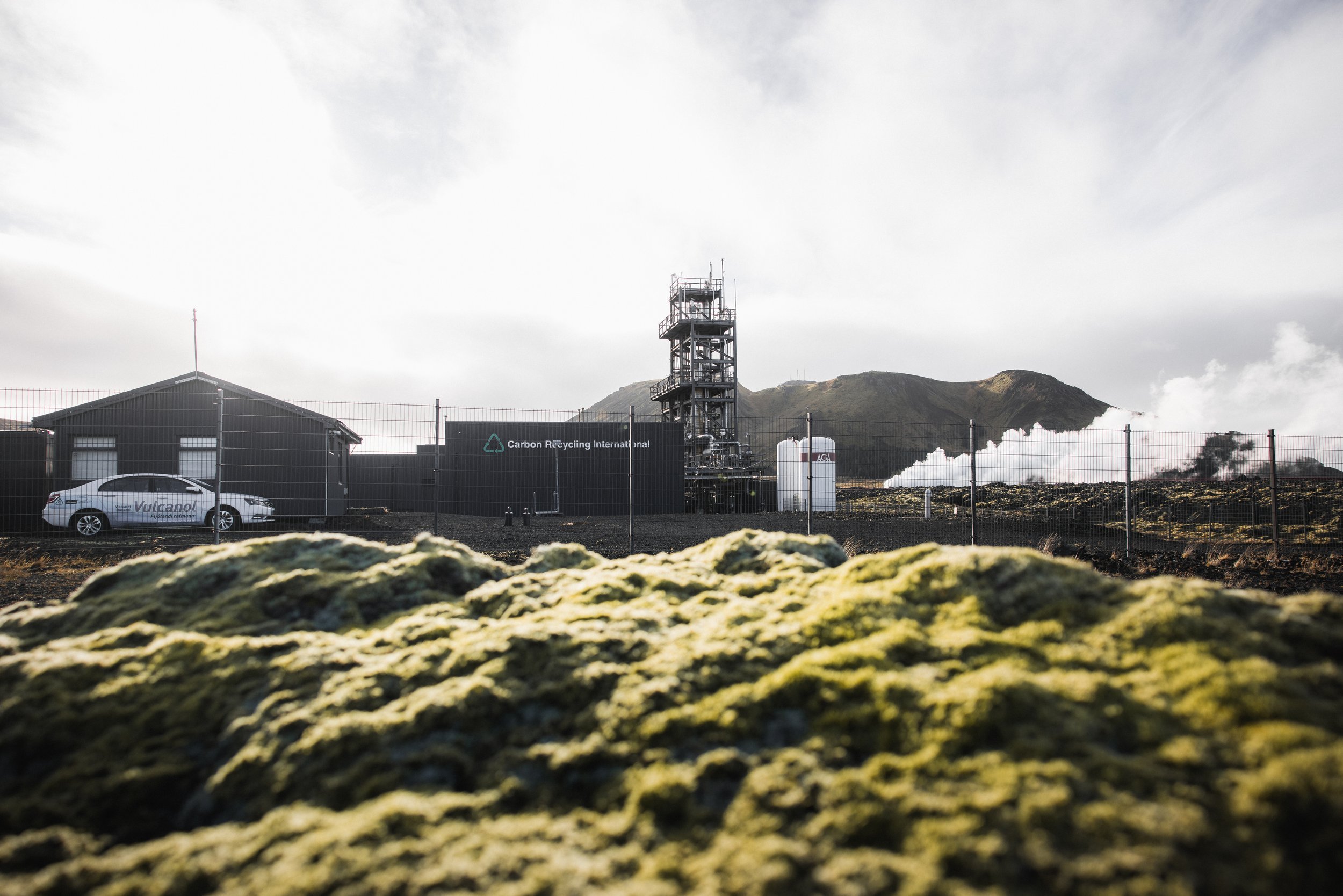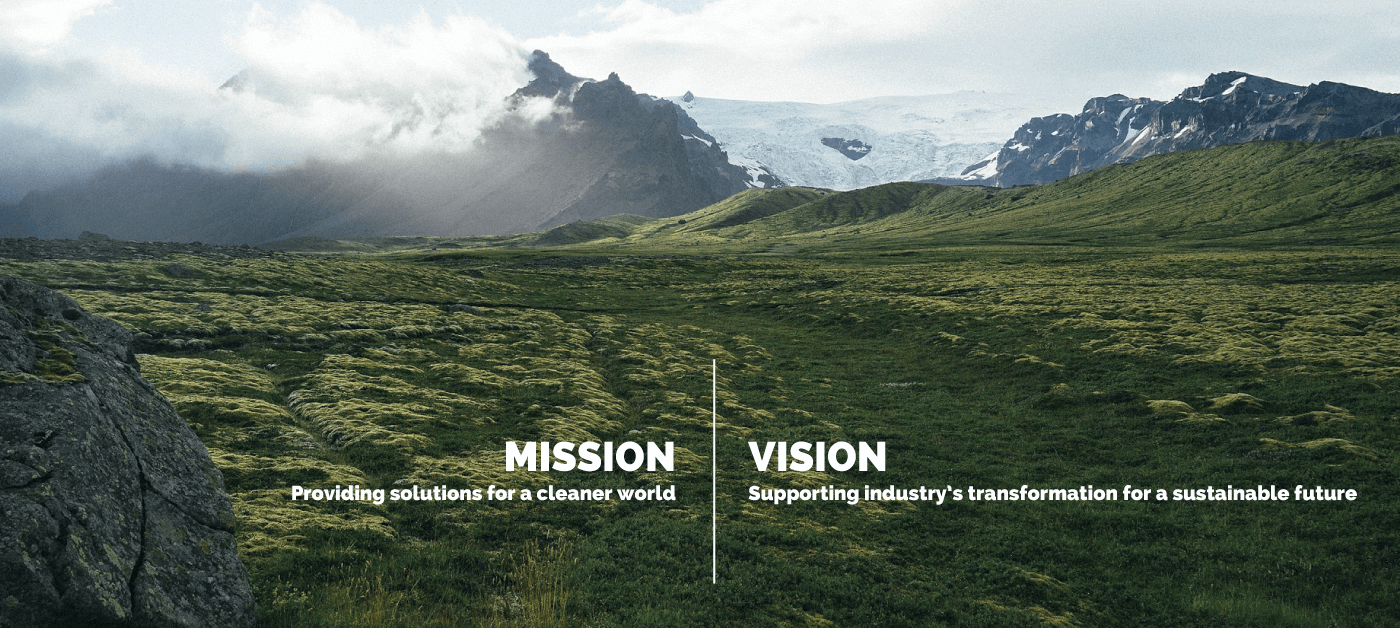
ABOUT
Carbon Recycling International (CRI) was founded in Iceland in 2006 around the idea of recycling carbon dioxide emissions by utilizing it to make useful products. Today, from our main office in Reykjavik, and with colleagues around the world, we develop and market our ETL process technology and supporting services for producing methanol from carbon dioxide emissions and biogenic carbon.
Guided by values of Innovation, Leadership and Cooperation, we facilitate a transition to a more circular economy through our innovative approach to carbon capture and utilisation globally.
WHAT WE DO
Carbon Recycling International designs, licenses and sells our proprietary Emissions-to-Liquids (ETL) process technology for producing green methanol from captured carbon dioxide emissions and green hydrogen. CRI’s ETL process represents an enabling technology for the energy transition, meeting a zero net CO₂ emissions target and reducing society’s dependence on fossil fuels. Through our efforts we support three key developments towards a more sustainable, circular economy:
-

CARBON REDUCTION
CRI’s ETL technology enables large scale utilization of carbon dioxide and/or hydrogen waste streams, providing an economic incentive for carbon reduction in industrial manufacturing and power generation. Through the virtuous cycle of greenhouse gas reduction and the potential for vastly increased use of renewable electricity, societies can more rapidly wean themselves of dependency on fossil fuels and become both carbon neutral and energy independent.
-

ENERGY STORAGE
A key challenge to increased integration of renewable energy into the global power network is the fluctuating nature of wind and solar power as the transmission networks aren’t designed to accommodate dynamic power loads. Combining water electrolysis with production of methanol is the most efficient method of storing energy in the form of a liquid fuel and offers desired load following capability to the grid.
-

ENERGY TRANSITION
Methanol is a versatile molecule used as clean burning fuel and base chemical for various processes. Methanol produced using CRI’s technology consists of ultra-low carbon intensity, or a carbon reduction of more than 90% compared to fossil fuels, in the complete product life-cycle. Methanol combusts without forming particles and soot, emits no sulphur compounds and forms small amounts of nitrous oxides, representing a viable solution for the energy transition of mobility and chemical production.

PARTNERS
CRI & JM have agreed a long-term catalyst supply agreement for the use of JM’s KATALCO methanol catalyst in CRI’s Emissions-To-Liquids (“ETL”) designed CO2 to MeOH plants. This will support the development of sustainable Methanol from both CO2 recovered from existing industrial processes and CO2 from biomass or atmospheric sources.
CRI´s ETL (Emissions To Liquids) technology has a long history of development beginning in 2006 with CRI´s vision to directly hydrogenate CO2 for the production of methanol. CRI began pilot-scale testing and in collaboration with JM and Jacobs (now Worley), the first phase of the George Olah plant was designed and built in 2011 under license from JM, using JM catalyst focused on CO2 utilization.
CRI continued to develop its ETL technology, expanding and redesigning the George Olah plant, based on experience from the George Olah plant and R&D projects, ensuring an optimized technology solution for CO2 based methanol production using JM catalysts.
CRI now offers its ETL technology solution for the direct CO2 hydrogenation process in collaboration with JM who is the catalyst supplier for this application. The benefits are :
CRI provides 10 years of operating and design experience from its ETL process in Iceland, Germany, China and Sweden in various industrial settings.
JM offers over 5 decades of catalysts development, manufacturing and applications experience.
MFE or Methanol From Emissions is a Joint Venture (JV) between CRI and its business partners in China, established in Shanghai.
MFE works with CRI to market, sell and implement ETL technology projects in the Chinese market.
HISTORY
FIRST OF A KIND
-

2006
Company founded in Reykjavik Iceland. Equity raised from angel investors, Icelandic VC and family funds.
-

2007 - 2009
ETL Technology and IP development. Proof-of-Principle in a lab scale pilot-plant.
-

2010 - 2011
Engineering, design and construction of the first-of-its kind demonstration plant, The George Olah Renewable Methanol plant in Svartsengi, Iceland.
-

2012
The GO plant is commissioned and CRI becomes the first company to produce and market e-methanol under the brand name Vulcanol.
-

2012 & 2015
Methanex and Geely become strategic investors in CRI.
-

2014
CRI receives its first large EU grant for development and demonstration of its ETL technology in the MefCO₂ project.
-

2015
The George Olah plant completed its production capacity expansion and upgrades.
-

2016
Geely Methanol car fleet trials start in Iceland.
-

2019
CRI signs the contract for the first commercial scale ETL plant to be constructed in Anyang, China.
-

2019
CRI demonstrates ETL plant load following capability in the MefCO₂ project in Germany.
-

2020
CRI and Statkraft announce the joint development of a 100.000 t/y e-methanol plant in Finnfjord, Norway.
-

2021
On site construction starts for the Shunli project in Anyang.
-

2021
CRI delivers the first batch of sustainable methanol to be used as marine fuel aboard the Stena Germanica. The methanol was produced from residual blast furnace gas in the FReSMe project in Sweden.
-

2021
CRI signs its second contract for a 100.000 t/y ETL plant with Jiangsu Sailboat.
-

2022
Successful startup of the world’s largest CO₂ to Methanol plant at the Shunli project site in Anyang.
-

2023
CRI completes 30M USD financing round with new investors led by Equinor Ventures
-

2023
CRI and Jiangsu Sailboat start up the world’s most efficiient carbon dioxide to methanol plant.
-
2023
CRI and P1 Fuels sign contract to deliver eFuels production unit to Germany






